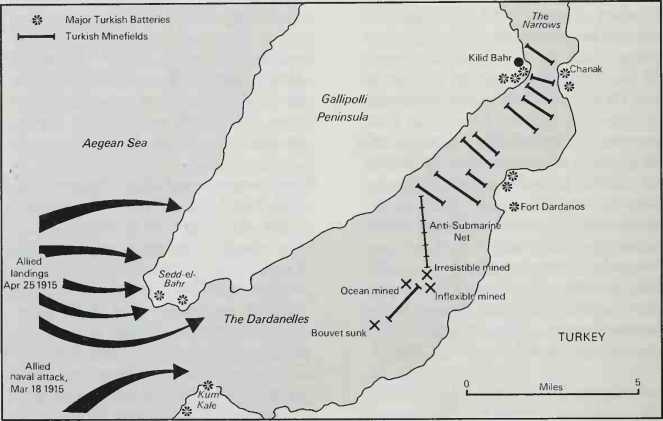
Opening Allied moves in the ill-fated Dardanelles/Gallipoli campaign, spring 1915
Dams raid. On May 16-17 1943, 617 Squadron, using bouncing bombs designed by Barnes Wallis, breached the Mohne and Eder dams in the Ruhr valley. The attacks had to be delivered from an altitude of precisely 60ft (18.3m) and an exact accuracy of aim was required. The hazards of the operation were exceptional and, of the 19 Lancasters dispatched, eight were lost and two seriously damaged. This was, perhaps, the most brilliant feat of bombing in World War II. Wing Commander Gibson, who led the attack, was awarded the VC. An enormous flood was caused and the shock to the Germans was profound, but the effect on their war effort proved to be negligible due to the speed with which they succeeded in controlling and then repairing the damage. It was fortunate too for the Germans that the attacks on the associated Sorpe and Schwelme dams failed. The most enduring signiflcance of the raid was the development of bombing and target-marking techniques which followed from it. ANF.
Da Nang. South Vietnam’s second largest city; headquarters of the Republic of Vietnam I Corps Tactical Zone. The first American combat units landed near Da Nang on March 8 1965. Its jet-capable airfield and major port were developed as a major logistical base for both South Vietnamese and American forces. In spring 1966, troops dispatched from Saigon brutally suppressed massive demonstrations protesting against Premier Nguyen Cao Ky’s postponement of elections and dismissal of the popular I Corps commander, Gen Nguyen Chanh Thi. Da Nang’s population swelled during the war to half a million, and chaotic conditions created by a huge tide of refugees during the last offensive helped communist forces to seize the city without a fight on March 29 1975. WST.
D’Annunzio, Gabriele (18631938). Italian. Poet, playwright and novelist - a distinguished Italian Air Force pilot during World War I — who did much to generate the nationalist upsurge within Italy after Caporetto in October 1917.
Danzig see polish corridor.
Darby, Brig Gen William Orlando (1911-1945). US. Commander of US Army’s first Ranger unit. May 1942. 1st, 3rd and 4th Ranger Battalions were called “Darby’s Rangers”. Killed in action.
Dardanelles, naval operations in
The (1915). The Allied attempt to force the Dardanelles Straits and threaten Constantinople stemmed directly from a Russian request, on January 2 1915, for a demonstration against the Turks in order to induce the latter to withdraw troops from the Caucasus and thus relieve pressure on the Russians in that theatre. In Britain this request led Winston Churchill, the First Lord of the Admiralty, who was among those seeking an alternative to the trench deadlock in France, to revive his earlier proposal for a joint military and naval attack on the Dardanelles. Despite Kitchener’s assertion that no troops could be spared for some time, Churchill won approval for a naval expedition “to bombard and take the Gallipoli peninsula with Constantinople as its objective”. Before the end of January the French also agreed to cooperate.
From February 19 1915, Allied warships, under Vice Adm Carden, intermittently bombarded ¦ the forts at Sedd-el-Bahr and Kum Kale which guarded the entrance to the Straits. Between February 26 and March 3 demolition parties of marines were landed, moving about freely on ground which was fiercely contested two months later. By mid-March the outer forts had been reduced, but Turkish reinforcements were now arriving and mobile howitzers were seriously hampering the work of Allied minesweepers. The Allies still had to subdue the defences of the Narrows, less than a mile wide and protected by minefields as well as the Kilid Bahr and Chanak forts. The main attack was launched on March 18 by 14 British and 4 French capital ships under Vice Adm de Robeck, who had replaced the ailing Carden. Initially all went well and fire from the batteries at the Narrows began to slacken. However, during the afternoon, the French battleship Bouvet blew up. The British battlecruiser Irresistible and the battleship Ocean were also fatally holed. Both sank, while the French battleships Gaulois and Suffren and the British battlecruiser Inflexible were all disabled. These losses prompted de Roebeck to call off the attack and although, as recent evidence suggests, the Turkish defenders of the Straits had been near collapse, he subsequently refused to resume operations without military aid. PJS.
Darfur. In April 1915, Ali Dinar, ruler of Darfur, renounced his allegiance to the Sudanese government. Supported by pro-Turkish elements, he threatened to invade the Sudan in early 1916. An Anglo-Egyptian force defeated his army on May 22 1915 and, in December, Darfur was incorporated as a province of the Sudan.




 World History
World History
![Stalingrad: The Most Vicious Battle of the War [History of the Second World War 38]](https://www.worldhistory.biz/uploads/posts/2015-05/1432581864_1425486471_part-38.jpeg)








